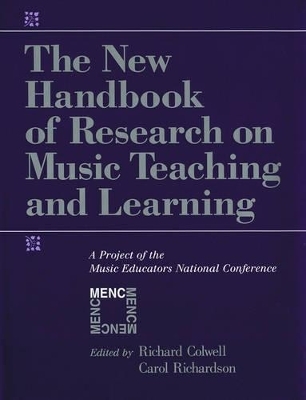
The New Handbook of Research on Music Teaching and Learning
Oxford University Press Inc (Verlag)
978-0-19-513884-9 (ISBN)
The original Handbook of Research on Music Teaching and Learning was published in 1992 by Schirmer Books with the sponsorship of the Music Educators National Conference (MENC) and was hailed as "a welcome addition to the literature on music education because it serves to provide definition and unity to a broad and complex field" (Choice). This new companion volume, again with the sponsorship of the MENC, will take into account the significant changes in music education in the intervening years. This second volume involves the profession's best scholars on each topic. It not only surveys the literature, but also presents the significance of the research, evaluates new developments, and frames issues, theories, and ideas with suggestions for future research. This volume features an expanded section on teacher education. An internationally balanced mix of contributors, and sections on arts advocacy, music and medicine, and the sociology of music.
Richard Colwell is Professor Emeritus of Music Education at the University of Illinois and Adjunct Professor of Music Education at the University of Michigan. He is the founding editor of the Bulletin of the Council for Research in Music Education and the Quarterly Journal of Music Teaching and Learning. He is also a Guggenheim scholar. Carol Richardson is Associate Professor and Chair of Music Education at the School of Music, University of Michigan. She currently chairs t e Music Education SIG of the American Educational Research Association. She received a National Acade
SECTION ONE: ISSUES AND RESEARCH ; 1. Policy Frameworks, Research and K-12 Schooling ; 2. MENC: A Case in Point ; 3. Recent Trends and Issue in Policy-making ; 4. Law Research and Music Education ; INTRODUCTION: TOWARD AN UNDERSTANDING OF THE 'AIMS OF MUSIC EDUCATION' ; 1. Contemporary Curriculum Practices and Their Theoretical Bases ; 2. Theory, Research, and the Improvement of Music Education ; 3. A Comparative Review of Human Ability Theory: Context, Structure, and Development ; 4. Critical Thinking ; 5. Improvisation ; 6. Improvisation and Curriculum Reform ; 7. Adult Education ; 8. Music and Early Childhood Education ; 9. Systematic Research in Studio Instruction in Music ; 10. Philosophical Issues in Curriculum ; 11. Educating Musically ; 12. Distance Learning and Collaboration in Music Education ; SECTION THREE: MUSICAL DEVELOPMENT AND LEARNING ; Introduction: Issues in Perception, Cognition, and Development ; 1. Learning Theories as Roots of Current Musical Practice and Research ; 2. Systematic Instruction ; 3. Behavioural Research on Direct Music Instruction ; 4. Self-Regulation of Musical Learning: A Social Cognitive Perspective ; 5. Motivation and Achievement ; 6. Developmental Characteristics of Music Learners ; 7. Creative Research in Music, Visual Arts, Theater, and Dance ; 8. Computer-based Technology and Music Teaching and Learning ; SECTION FOUR: MUSICAL COGNITION ; 1. The Neurobiology of Music Cognition and Learning ; 2. Cognitive Constraints on Music Listening ; 3. The Development of Musical Abilities ; 4. Making Music and Making Sense of Music: Expressive Performance and Communication ; 5. Taking an Acquired Skills Perspective on Music Performance ; SECTION FIVE: SOCIAL AND CULTURAL CONTEXTS ; 1. The Sociology of Education and Connections to Music Education Research ; 2. Sociology of Music ; 3. Social Psychology and Music Education ; 4. Music, Culture, Curriculum and Instruction ; 5. Feminism, Feminist Research and Gender Research in Music Education ; 6. The Social Construction of Music Teacher Identity in Undergraduate Music Education Majors ; 7. Transforming Research in Music Education History ; 8. Music Transmission and Learning: A Conspectus of Ethnographic Research in Ethnomusicology and Music Education ; 9. Community Music: Toward an International Overview ; SECTION SIX: TEACHER EDUCATION ; Introduction: Fuzzy Teacher Education ; 1. Reform-minded Music Teachers: A More Comprehensive Image of Teaching for Music Teacher Education ; 2. Teaching as a Profession: Two Variations on a Theme ; 3. Changing Concepts of Teacher Education ; 4. Strengthening the Teaching of Music Educators in Higher Education ; 5. Research by Teachers on Teacher Education ; 6. Research in Music Student Teaching ; 7. Professional Development ; SECTION SEVEN: MUSIC EDUCATION CONNECTIONS ; Introduction: The Growing Impact of Partnerships: A Reason for Research ; 1. Policy Issues Connecting Music Education and Arts Education ; 2. The Evaluation of Arts Partnerships and Learning Through the Arts ; 3. The 'Use and Abuse' of Arts Advocacy and its Consequences for Music Education ; 4. Research in Visual Arts Education: Implications for Music Education ; 5. A Review of Research in Theater, Dance, and Other Performing Arts Education: Implications for Music ; SECTION EIGHT: NEUROSCIENCE, MEDICINE, AND MUSIC ; 1. Music and Neuroscience ; 2. Performing arts Medicine ; 3. Musicians' Health ; MIRIAM HENOCH, AND JOHN HIPPLE ; SECTION NINE: INSTRUMENTAL OUTCOMES ; 1. Nonmusical Outcomes of Music Education: Historical Considerations ; 2. Teaching Other Subjects Through Music ; 3. Research: A Foundation for Arts Education Advocacy ; SECTION TEN: RESEARCH DESIGN, CRITICISM, AND ASSESSMENT IN MUSIC EDUCATION ; 1. Philosophical Perspectives on Research ; 2. Maintaining Quality in Research and Reporting ; 3. Trends in Data Acquisition and Knowledge Development ; 4. Assessment's Potential in Music Education ; 5. Contemporary Issues in Qualitative Research and Music Education
| Zusatzinfo | numerous tables and figures |
|---|---|
| Verlagsort | New York |
| Sprache | englisch |
| Maße | 282 x 226 mm |
| Gewicht | 3082 g |
| Themenwelt | Kunst / Musik / Theater ► Musik ► Musiktheorie / Musiklehre |
| Sozialwissenschaften ► Pädagogik | |
| ISBN-10 | 0-19-513884-8 / 0195138848 |
| ISBN-13 | 978-0-19-513884-9 / 9780195138849 |
| Zustand | Neuware |
| Haben Sie eine Frage zum Produkt? |
aus dem Bereich


